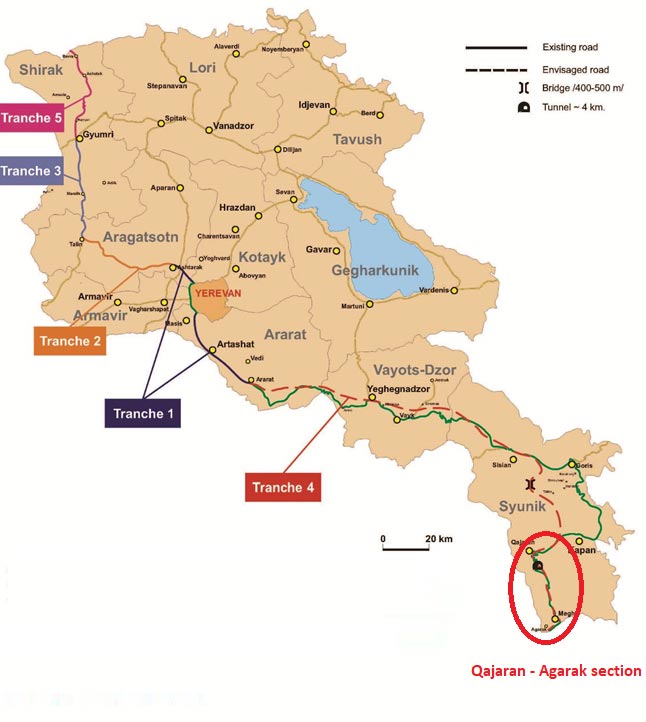-
CENTRES
Progammes & Centres
Location
Armenia’s North-South road demonstrates this collaborative spirit is a strategic route that can bring much-needed ease of trade in the Eurasian region

Image Source: Getty
This article is part of the essay series “Sagarmanthan Edit 2024”
For millennia, regional infrastructure and trade routes have had not only economic and political significance but also civilisational importance. In the pursuit of economic gain, countries and people are compelled to communicate with one another, collaborate, and find solutions to political issues, playing a fundamental role in the development and spread of civilisations.
One of the pages in the history of world trade was written by Armenian merchants, who conducted extensive commercial activities from India to Europe, utilising the pan-Armenian network. This international trade had a civilisational impact on all countries in the region. It not only facilitated the exchange of goods but also established people-to-people ties.
In the pursuit of economic gain, countries and people are compelled to communicate with one another, collaborate, and find solutions to political issues, playing a fundamental role in the development and spread of civilisations.
Today, we see similar global initiatives aimed at expanding trade ties between Asia and Europe. One such project is the North-South Corridor, which begins at the ports of India and ends in Europe. This corridor will not only shorten transportation times and boost trade but also establish long-term stability and peace in Asia. Since 2009, Armenia has been carrying out the construction of the North-South road corridor, aiming to facilitate the delivery of goods from the Iranian border to Georgia, the Black Sea, and onwards to Europe along a new shorter road. The North-South road of Armenia spans 556 kilometres. It is important to emphasise that the shortest and safest road from India to Europe (via the Iranian port of Chabahar) passes through Armenia and Georgia, which, at the moment, is about 20 percent of the North-South road. Once set up, it will decrease transportation costs of one ton of cargo per kilometre by US$ 2, which will make transportation in this direction even more competitive.
According to the approved plan, the North-South road corridor in Armenia consists of five tranches. At present, the first tranche has been completed and construction work is being carried out for tranche three and four.

Chinese and Iranian companies are participating in the construction of the North-South Corridor in Armenia, and the construction work is primarily funded by European and Asian banks (Asian Development Bank, International Bank for Reconstruction and Development, and European Bank for Reconstruction and Development). Indian construction firms and financial institutions bring significant experience to similar projects, making their participation in Armenian initiatives advantageous.
Armenia has preferential trade arrangements with the European Union, the United States, Canada, and Japan.
It is also worth noting that Armenia shares historical, mutually beneficial, and friendly relations with Iran, India, Georgia, and the European nations. Moreover, Armenia is a member of the Eurasian Economic Union, which enables the export and import of goods to and from Russia, Belarus, Kazakhstan, and Kyrgyzstan without customs duties and non-tariff restrictions. At the same time, Armenia has preferential trade arrangements with the European Union, the United States, Canada, and Japan. Specifically, in 2023-2024, Russian gold and diamonds were exported via Armenia to India (US$ 31 million), the United Arab Emirates (US$ 4.5 billion) and China (US$ 1.6 billion). Similarly, European, American and other goods (cars, equipment, materials, etc.) reach Russia (US$ 3.5 billion) through this route․ If regional infrastructure and trade connections are developed, it will be possible to implement mechanisms for exporting other goods as well.
Public diplomacy and active expert engagement will contribute to the development and dissemination of ideas, while companies in the private sector can gain the necessary information to start their operations. The time for toasts has passed; now is the time for action.
Suren Parsyan is an Associate Professor at the Armenian State University of Economics
The views expressed above belong to the author(s). ORF research and analyses now available on Telegram! Click here to access our curated content — blogs, longforms and interviews.

Suren Parsyan is a PhD candidate of economics, an associate professor at the Armenian State University of Economics and a lawyer. His professional interests include ...
Read More +